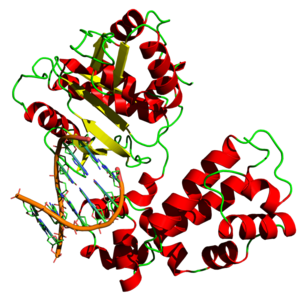DNA polymerase facts for kids
A DNA polymerase is a special helper molecule, called an enzyme, that builds DNA molecules. It uses tiny building blocks called nucleotides to create new DNA strands.
DNA polymerases are super important for DNA replication. This is the process where a cell makes exact copies of its DNA. They usually work in pairs to copy one two-strand DNA molecule into two new, identical two-strand DNA molecules.
When DNA polymerase works, it "reads" an existing piece of DNA. Then, it uses that information to make a brand new piece that is exactly the same. Its main job is to accurately copy all the DNA in a cell. This makes sure that the genetic instructions are kept safe and passed on correctly when cells divide or when living things reproduce.
Other Important Jobs
DNA polymerases do more than just copy DNA. They also help with other important tasks inside cells.
- DNA repair: They can fix mistakes or damage in DNA.
- Genetic mixing: They help mix up genetic information.
- Making DNA from RNA: Some special ones can even make DNA from RNA.
- Antibody production: They play a role in how our bodies make antibodies to fight off sickness.
How DNA Polymerase Builds DNA
DNA polymerase can only add new DNA building blocks to a specific spot on the existing DNA chain. This spot is called a 3'-OH group. Because of this, new DNA is always built in one specific direction, called the 5'–3' direction.
DNA Polymerase in Science
Scientists use DNA polymerases a lot in molecular biology labs. They are key tools for many important techniques, including:
- Polymerase chain reaction (PCR): This lets scientists make millions of copies of a specific piece of DNA very quickly.
- DNA sequencing: This helps scientists figure out the exact order of the building blocks in a DNA molecule.
- Molecular cloning: This is used to make copies of genes or other DNA pieces.
See also
 In Spanish: ADN polimerasa para niños
In Spanish: ADN polimerasa para niños
 | Kyle Baker |
 | Joseph Yoakum |
 | Laura Wheeler Waring |
 | Henry Ossawa Tanner |


